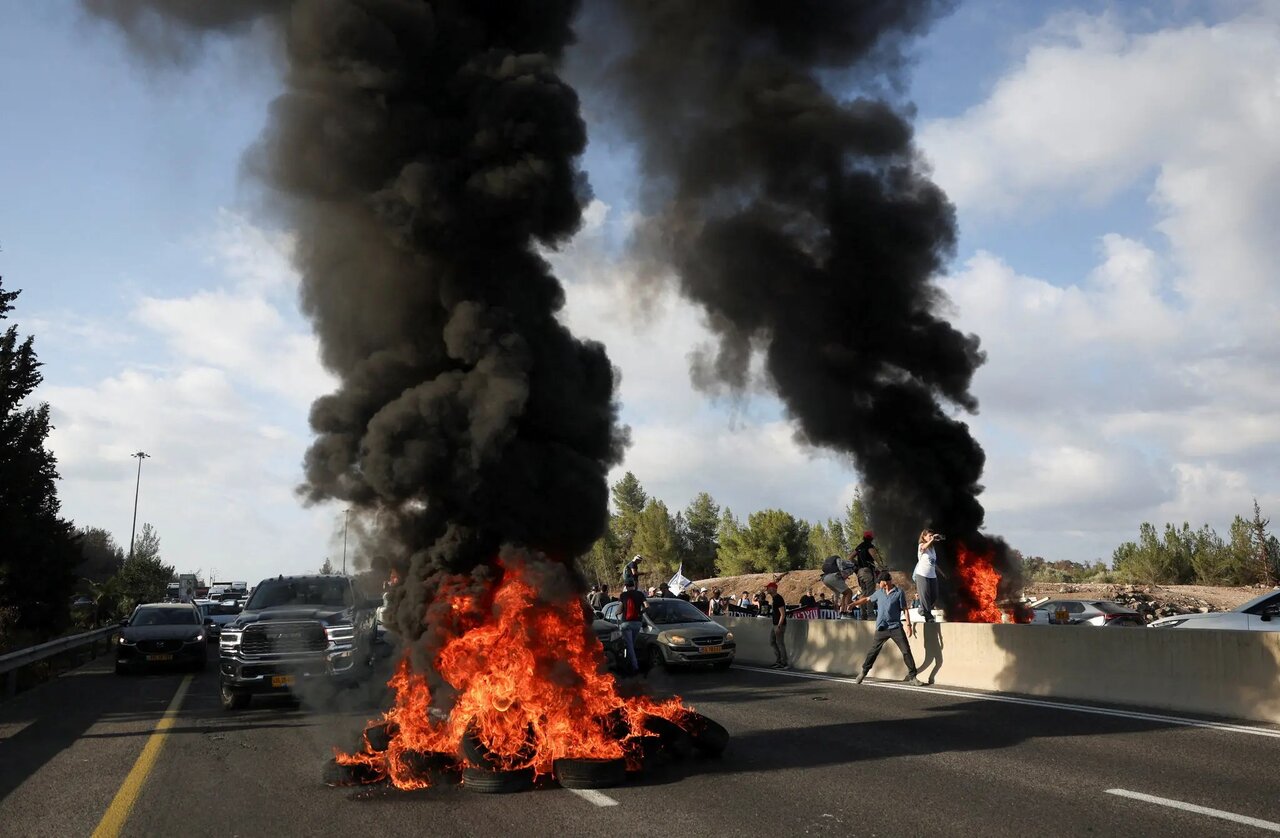Israel is crumbling from within

TEHRAN — Israel is facing unprecedented domestic and international pressure as the Gaza war nears its two-year mark. On Sunday, a massive strike exposed deep fractures within Israeli society over Prime Minister Benjamin Netanyahu’s handling of the war.
Organized by groups representing families of captives, the “day of stoppage” called for an urgent deal to end the war and secure the release of Israelis still held in Gaza. Protesters blocked roads, lit bonfires, and gathered outside political offices, military headquarters, and major highways. Police in Tel Aviv used water cannons to disperse crowds and arrested dozens of demonstrators. Many restaurants, theaters, and shops voluntarily closed in solidarity with the strike, signaling widespread public frustration.
The demonstration comes amid fears that continued military operations could further endanger the roughly 20 captives believed to remain alive in Gaza.
On October 7, 2023, Hamas carried out a surprise attack in southern Israel. Over 1,100 people were killed, and around 250 were taken captive. This was followed by Israel’s brutal war on Gaza. Netanyahu has repeatedly vowed to continue the war until Hamas is destroyed and all captives are released, but these efforts have largely failed. Many captives have been freed in swap deals with Hamas, not through military action, while others died in Israeli strikes on Gaza. Families continue to demand an immediate negotiated release, warning that further escalation could cost lives.
“Military pressure doesn’t bring hostages back — it only kills them,” said former hostage Arbel Yehoud at a protest in Tel Aviv, AP reported. Anat Angrest, mother of captive Matan Angrest, said, “Today, we stop everything to save and bring back the hostages and soldiers… to remember the supreme value of the sanctity of life.”
The strike also underscored deep political divisions within Israel. Far-right members of Netanyahu’s cabinet have opposed any deal that could leave Hamas in power, threatening to topple the government if concessions are made. Finance Minister Bezalel Smotrich described the strike as “harmful,” accusing protesters of playing into Hamas’ hands, while National Security Minister Itamar Ben-Gvir warned the action would “weaken Israel.” These statements reflect growing tension between hardline elements of the government and the broader public, increasingly frustrated by the stalemate and human cost.
Israel’s military strategy in Gaza has drawn widespread criticism. Nearly 62,000 Palestinians have been killed, tens of thousands displaced, and essential services — including water, electricity, and medical care — disrupted. Malnutrition and starvation are at their highest levels since the conflict began, according to Gaza’s Health Ministry. Hospitals report that children continue to die from hunger-related causes, while aid deliveries remain far below what is needed due to Israel’s blockade and restrictions.
The humanitarian crisis has fueled international condemnation. Israel is accused of committing genocide by the International Court of Justice, by rights groups operating even within Israel, and by UN experts monitoring the conflict. Netanyahu himself is wanted by the International Criminal Court for war crimes and crimes against humanity in Gaza. Analysts argue that the military campaigns are failing to defeat Hamas and are being pursued to obscure political failures and maintain Netanyahu’s hold on power.
On Sunday, more than a dozen aid-seekers were killed near the Morag corridor in Gaza as Israeli forces fired to disperse crowds. Since late May, over 1,900 aid-seekers have been killed and more than 14,288 injured, according to Gaza’s Health Ministry. The ministry said on Sunday that in the past 24 hours alone, 11 people had died of starvation, bringing the total hunger-related deaths during the 22-month conflict to 251, including 108 children. Humanitarian agencies warn that without immediate relief, conditions could deteriorate into widespread famine.
Despite these warnings, Israel is preparing for a broader invasion of Gaza City and other densely populated areas, aiming to dismantle Hamas’ military infrastructure. Military analysts caution that such an offensive could result in even higher civilian casualties and mass displacement, while potentially failing to decisively weaken Hamas.
The ongoing conflict and domestic protests reveal a fragile social and political environment in Israel. Demonstrations, strikes, and public outrage indicate the government’s struggle to reconcile military objectives with the safety of captives, while maintaining coalition cohesion. Sunday’s strike also showed Israel is crumbling from within, as frustration over the Gaza war deepens political and social divisions.
Leave a Comment